AWS vs Azure vs Google Cloud
Overview
The leader in cloud computing platforms is Amazon Web Services a branch of Amazon. With a wide range of services for practically everyone, including consumers, small enterprises, and even governments, AWS is the most advanced cloud management platform.
Microsoft Azure is the second-largest cloud management platform. Since its debut in 2010, Azure has developed into a cloud-based platform with more than 200 products and services. This one is one of the cloud platforms with the quickest growth right now. Thanks to Microsoft Azure, many organizations find it easy to switch to a cloud or hybrid-cloud environment, which provides a wide range of services tailored especially for Microsoft-centric firms.
A part of Google Cloud is the Google Cloud Platform. The Google Cloud Platform has expanded since its 2010 inception to include over 100 services covering big data, networking, computing, and much more. Google Workspace, business Android, and Chrome OS are now among the services GCP offers. GCP is the newest of the Big 3 cloud service providers compared to AWS and Azure.
Amazon Web Services (AWS)
a) What is AWS?
Amazon Web Services (AWS) provides pay-as-you-go computer resources and services that let users create scalable infrastructures and build apps in a matter of minutes. For instance, you may lease a server on AWS and connect to it, configure it, safeguard it, and operate it just like a real server. The virtual server's use of an AWS-managed planet-scale network makes it unique.

b) Features
Amazon anticipates providing a variety of features and services that may be useful for many types of tasks, whether they are simple or complex, small or large:
- Tools for developers
- Integration of cloud apps
- Solutions for computing and storage
- Analytics and artificial intelligence
- Productivity tools
c) Advantages and Disadvantages
Being the first contemporary cloud services provider and having a massive global operation are two of AWS's many advantages. Together, these elements have fueled AWS's expansion and enabled it to offer businesses worldwide a wide range of uninterrupted services.
Advantages include the following:
- A wide range of services
- Age(Maturity) and accessibility
- Includes macOS among the primary operating systems it supports (unlike other providers)
- Constant expansion of service options
- Able to manage a vast number of resources and end users
- Simple launch
Disadvantages include the following:
- Customer technical support costs extra
- The cost is relatively high
- Resources limits
- Extra charges for necessary services
Microsft Azure
a) What is Azure?
Microsoft offers a cloud computing service called Azure. A grouping of several cloud computing services, including remotely hosted and managed variations of Microsoft-exclusive technology used to create, test, deploy, and manage cloud-based applications.
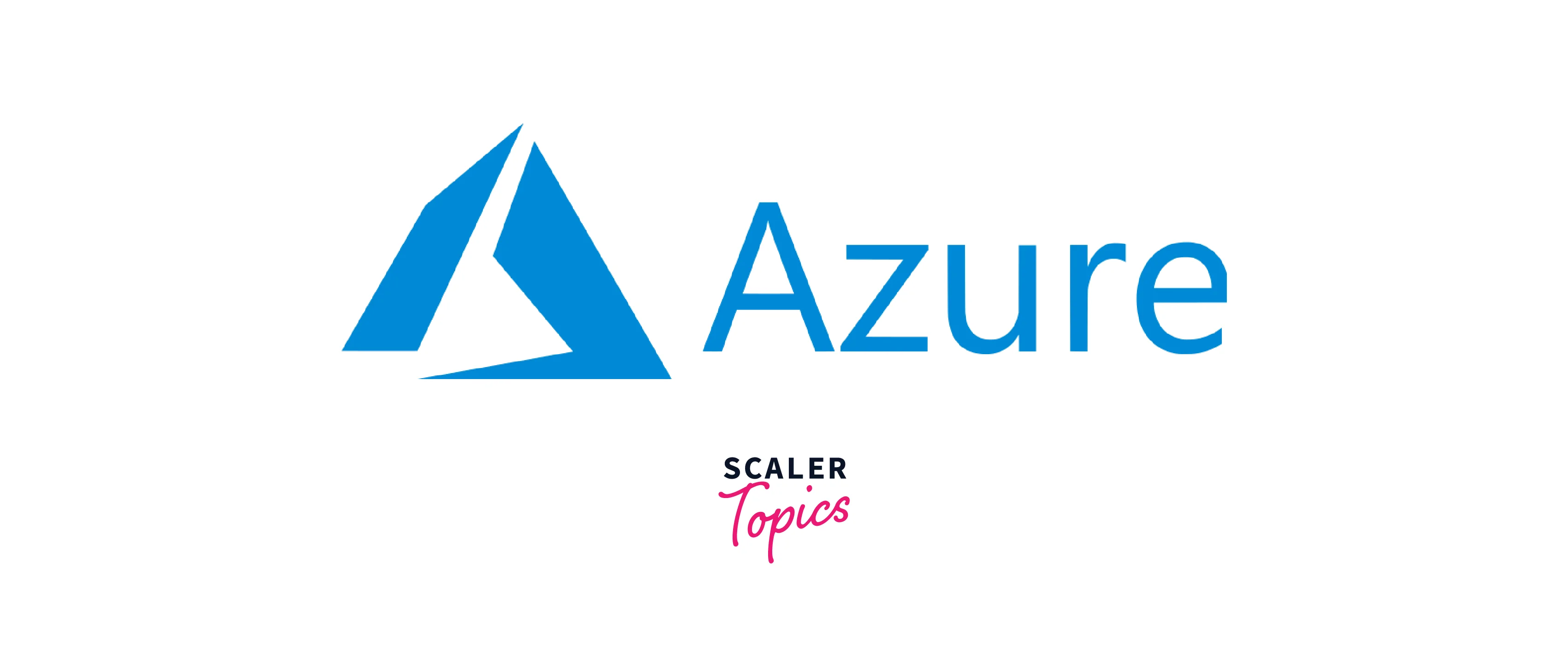
b) Features
Azure has taken advantage of the framework established by Microsoft's software and business app offerings to repurpose and provide several fast-delivered, easily configurable features or services, such as:
- DevOps attributes
- Predictive modeling
- A platform for cloud development
- Using blockchain technology
- Thorough IoT integration
c) Advantages and Disadvantages
Many of Azure's advantages stem from its long development history as a typical IaaS provider.
Advantages include the following:
- Affordable on-demand prices
- Several languages are supported via built-in programs (including Java, Python, .NET, and PHP)
- Widely accessible
- Configuration of the Microsoft software family is intuitive.
- Discounts on service contracts for users of Microsoft's cloud computing
- The use of high redundancy to cut downtime
Disadvantages include the following:
- There have been reports of network management issues.
- It might not feel as professional in design as other platforms.
- Insufficient data handling
- Some people think it's harder to learn on than other platforms.
- Complaints about technical assistance
Google Cloud Platform (GCP)
a)What is Google Cloud Platform?
The Google Cloud Platform offers a range of cloud computing services necessary for creating, deploying, scaling, managing, and operating a cloud. The same benefits that power Google products like Google Search and Google Drive are used here.

b) Features
GCP is swiftly catching up to the competition thanks to Google's sizeable worldwide presence and seemingly limitless capacity for innovation. At the moment, it provides features like:
- AI and machine learning engines for cloud app development, including cloud speech API, cloud vision API, and others
- Enterprise Analytics
- Productivity control
- Keeping and managing data
c) Advantages and Disadvantages
High-end processing, machine learning, and cloud developer tools are the strengths of Google Cloud Platform as a cloud platform with a strong developer focus.
Advantages include the following:
- Using well-known languages like Python and Java
- Outstanding scalability
- Simple configuration and setup
- Balanced data loads and quick responses
- Generous long-term discounts
Disadvantages include the following:
- Fewer services available
- Fewer data centers worldwide
- Lacking cutting-edge features
- Less variety in the characteristics
AWS vs Azure vs Google Cloud - The Key Disparities
A new wave of technology based on remote servers is sweeping the new digital world thanks to AWS, Microsoft Azure, and Google Cloud Platform. The public cloud market is highly competitive.
- The following types, on-demand, reserved, and spot, are available for AWS instances. Any models, including on-demand and limited-term commitments, can be used to purchase an Azure instance. For GCP, it would be from on-demand.
- AWS offers virtual server and machine instances. The virtual hard drives are provided by Azure, while Google Cloud provides the virtual machine instances.
- Users of AWS pay per hour. It employs a pay-as-you-go system. Azure bills its clients on a per-minute basis. Customers of Google Cloud are charged per minute.
- AWS utilizes Amazon cloud search for search functions. Azure Search is employed in Azure. It doesn't exist for Google Cloud.
- ECS is used in AWS for managing Docker. Azure uses container services for similar purposes. For managing Docker in the Google Cloud, Google Container Engine is utilized.
- The glacier is the archival storage system utilized by AWS. The cold line is used for archive storage in Azure and Google Cloud.
- AWS utilizes Amazon Kinesis for analytics. For Azure, stream analytics are used. The Google cloud platform uses analytics with cloud data flow and cloud data preparation.
- AWS cloud HSM is utilized by AWS for compliance. For compliance, the Azure trust center is employed for Google cloud it is Google cloud platform security.
- Automation in AWS is done via AWS ops work and configuration. Azure Automation is employed for Azure. Administration of the compute engines for the Google Cloud is done using puppet, chef, etc.
AWS vs. Azure vs. Google Cloud - Detailed Comparison
a) Establishment
- Elastic Compute Cloud (EC2) and Simple Storage Service (Amazon S3) were two services offered by Amazon Web Services when it became public in 2006. In addition to services like Amazon CloudFront - Content Delivery Network (CDN), Elastic Block System (EBS) was made publically accessible in 2009.
- Azure, the first name of Microsoft Azure, was created in 2010 to offer businesses a strong foundation for cloud computing. While "Azure" is still often used, the term "Microsoft Azure" got into service in 2014.
- In less than ten years since it was launched in 2008, the Google Cloud Platform has significantly impacted the cloud industry. Google's products, notably its wildly famous search engine and its video-sharing platform, YouTube, were reinforced by Google Cloud.
b) Availability Zones
- Twenty-four geographical areas make up the 77 availability zones of Amazon Web Services.
- More than 60 areas across the world have Microsoft Azure available.
- Twenty-four regions and 73 zones host the Google Cloud Platform and it's accessible in more than 200 nations and regions.
c) Market Shares and Growth Rate
Since the beginning of cloud computing, AWS has dominated the competition on a worldwide scale. AWS has a monopoly thanks to its approximately 32% share of the worldwide market. AWS is behind Microsoft Azure with 19% of the worldwide market share. GCP holds a 10% market share globally, placing it in third place.
Quick Look at the Cloud Market Share:
- AWS : 32%
- Microsoft Azure : 19%
- GCP : 7%
d) Who Uses Them?
- Some well-known companies that employ Amazon Web services include:
- Coursera
- Expedia
- Netflix
- Coinbase
- Intuit
- Airbnb
- Lyft
- Coca-Cola
- Famous Microsoft Azure customers include:
- Bosch
- Audi
- HSBC
- Starbucks
- Walgreens
- 3M
- FedEx
- Walmart
- Notable Google Cloud Platform (GCP) customers include:
- Toyota
- Equifax
- Nintendo
- Spotify
- Target
- The Home Depot
- Paypal
e) Services
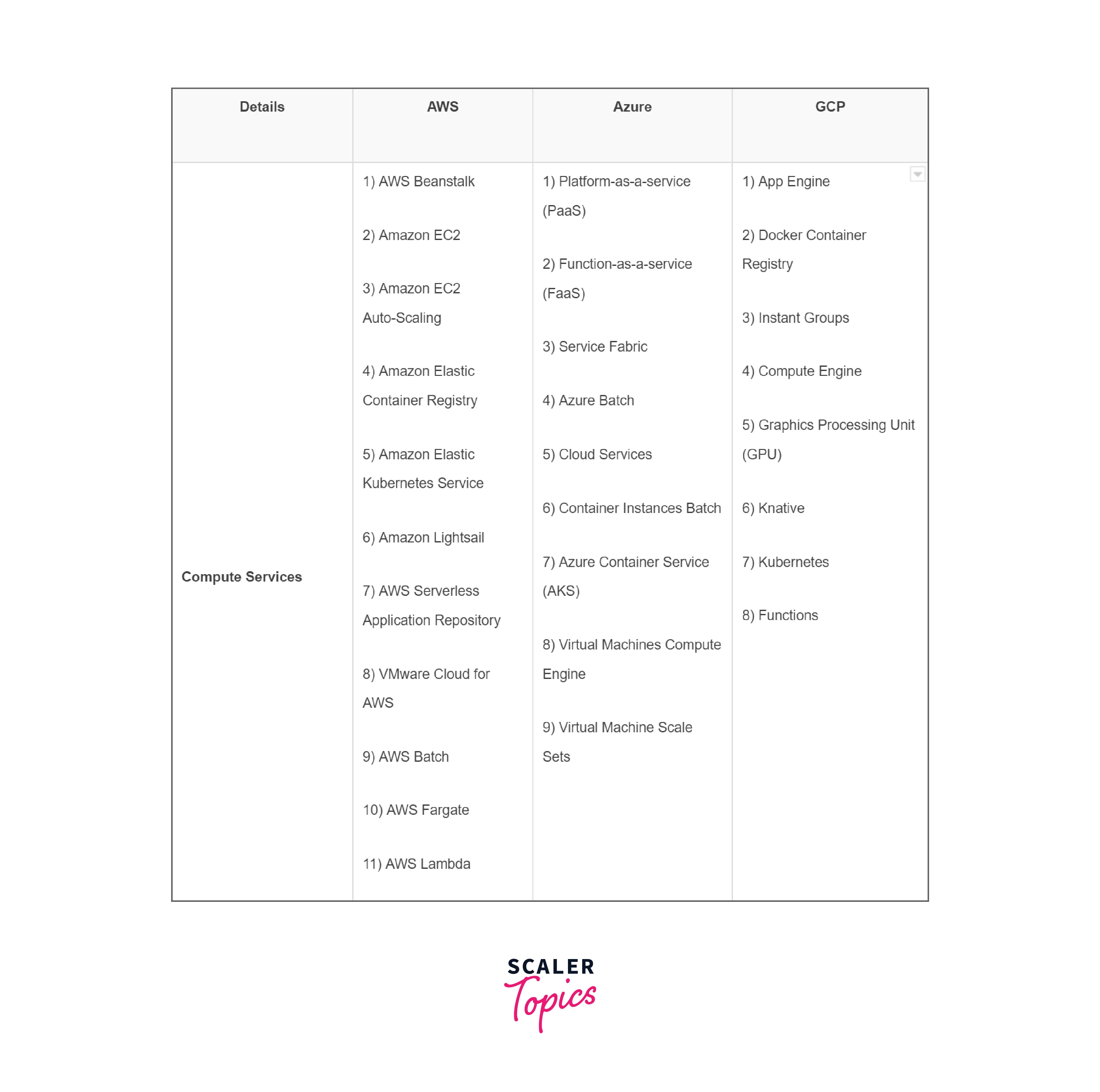
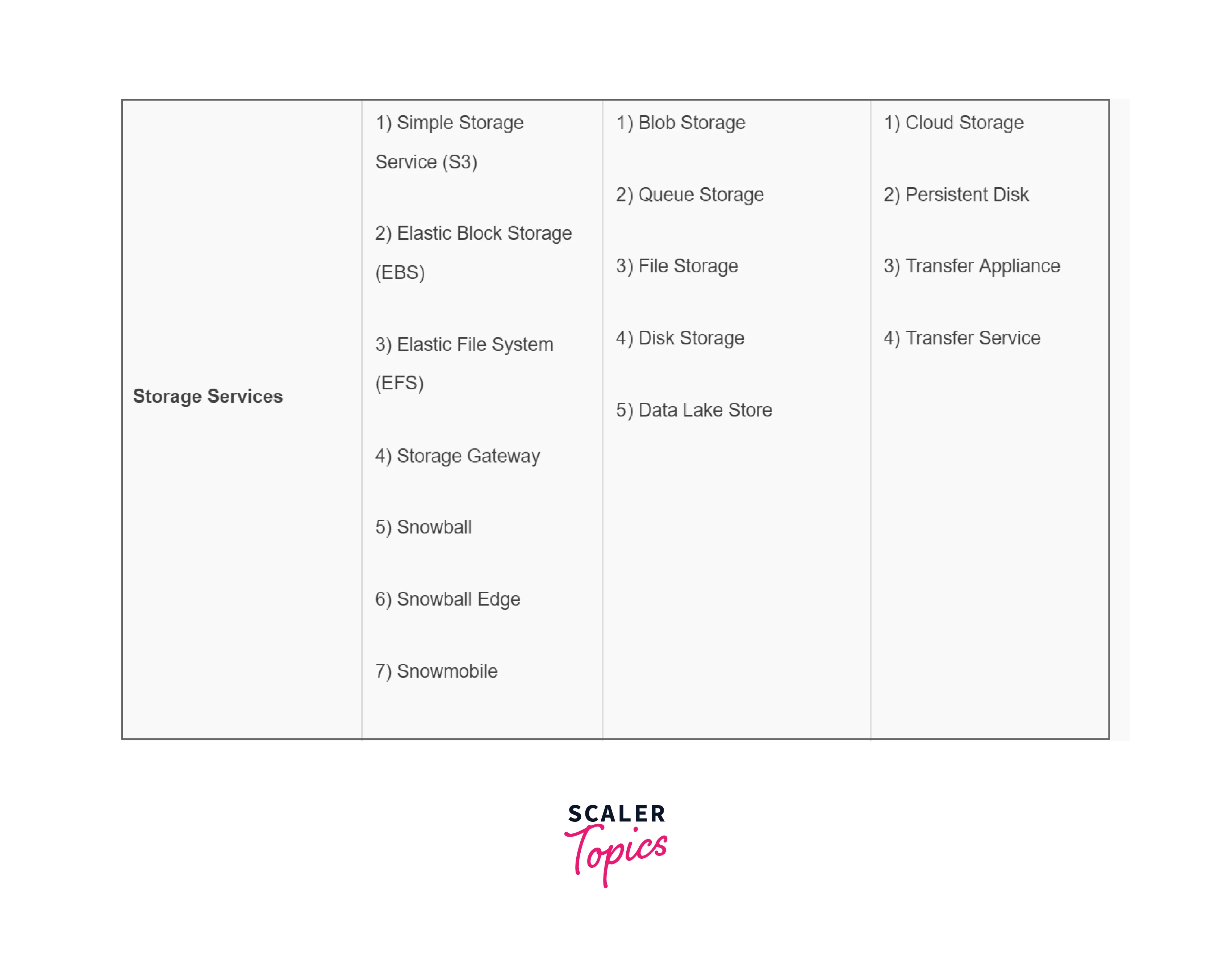
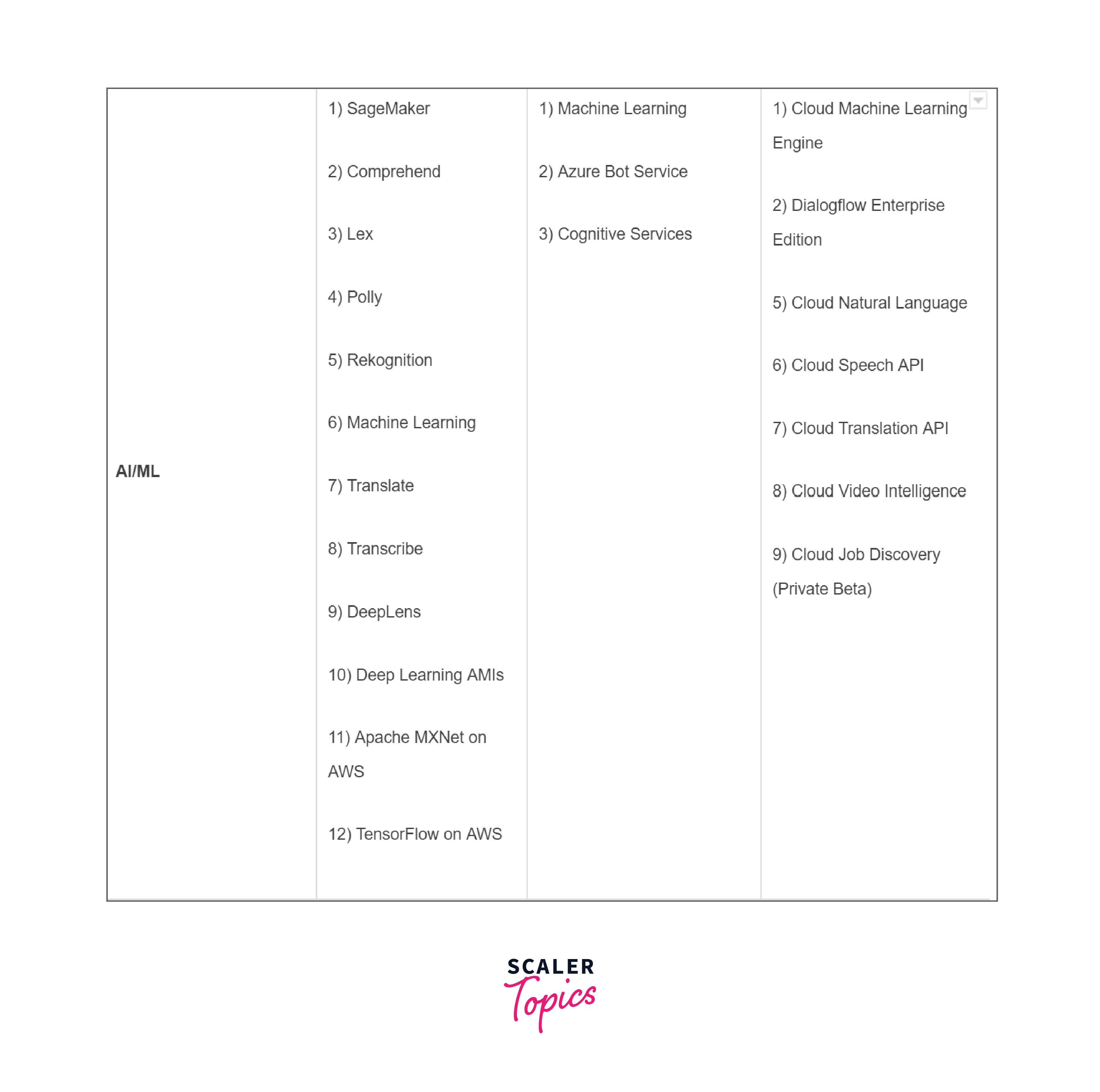
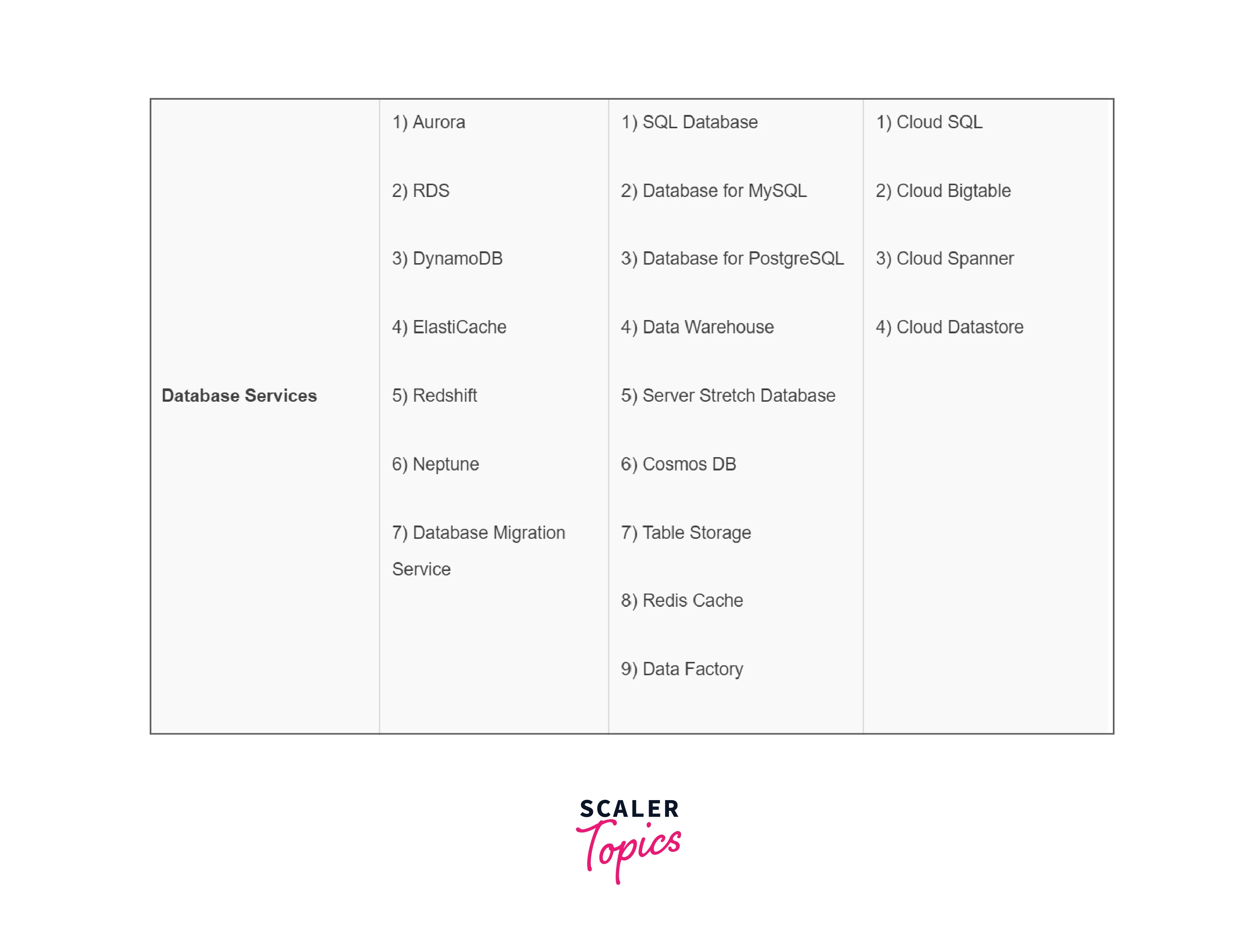
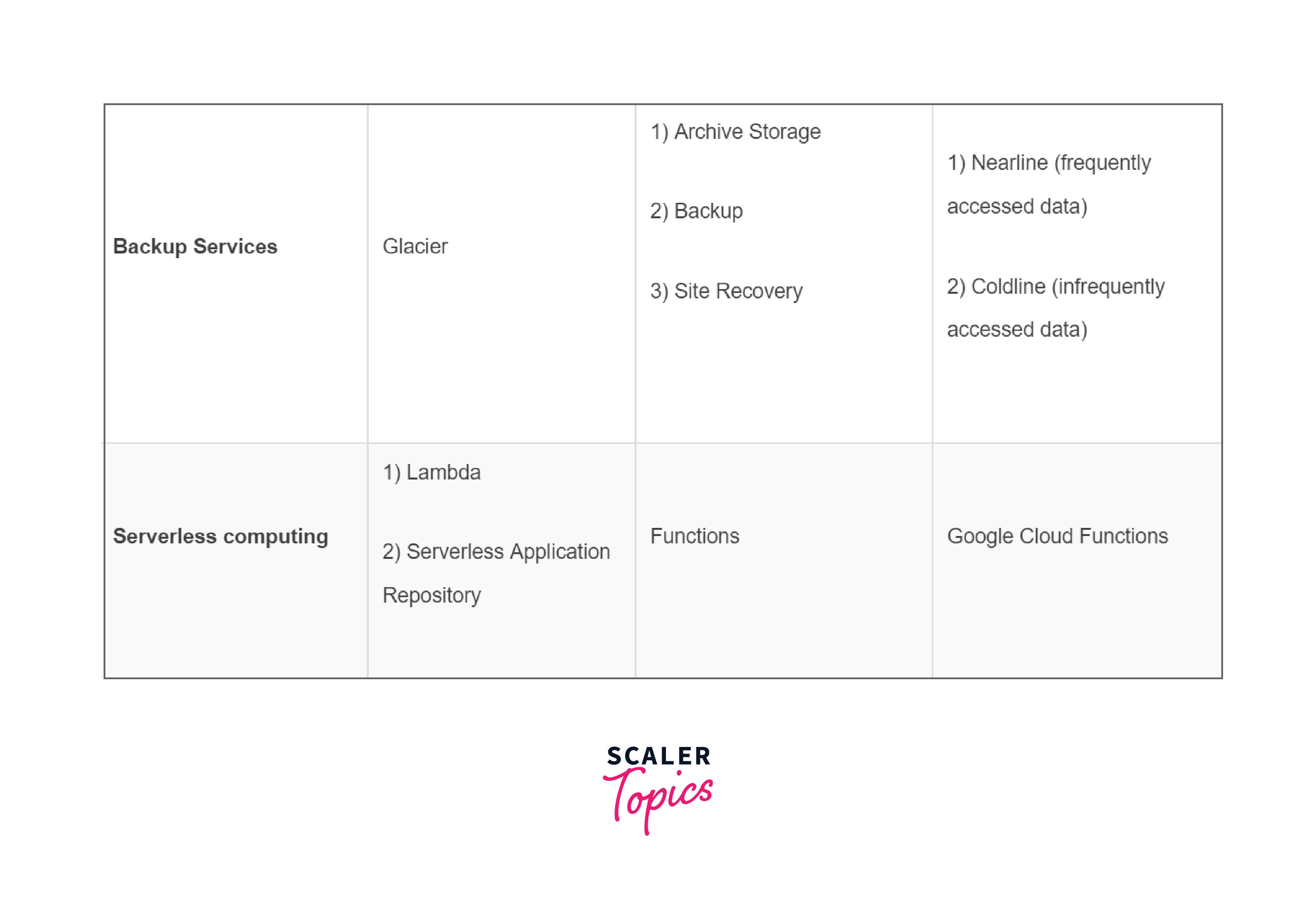
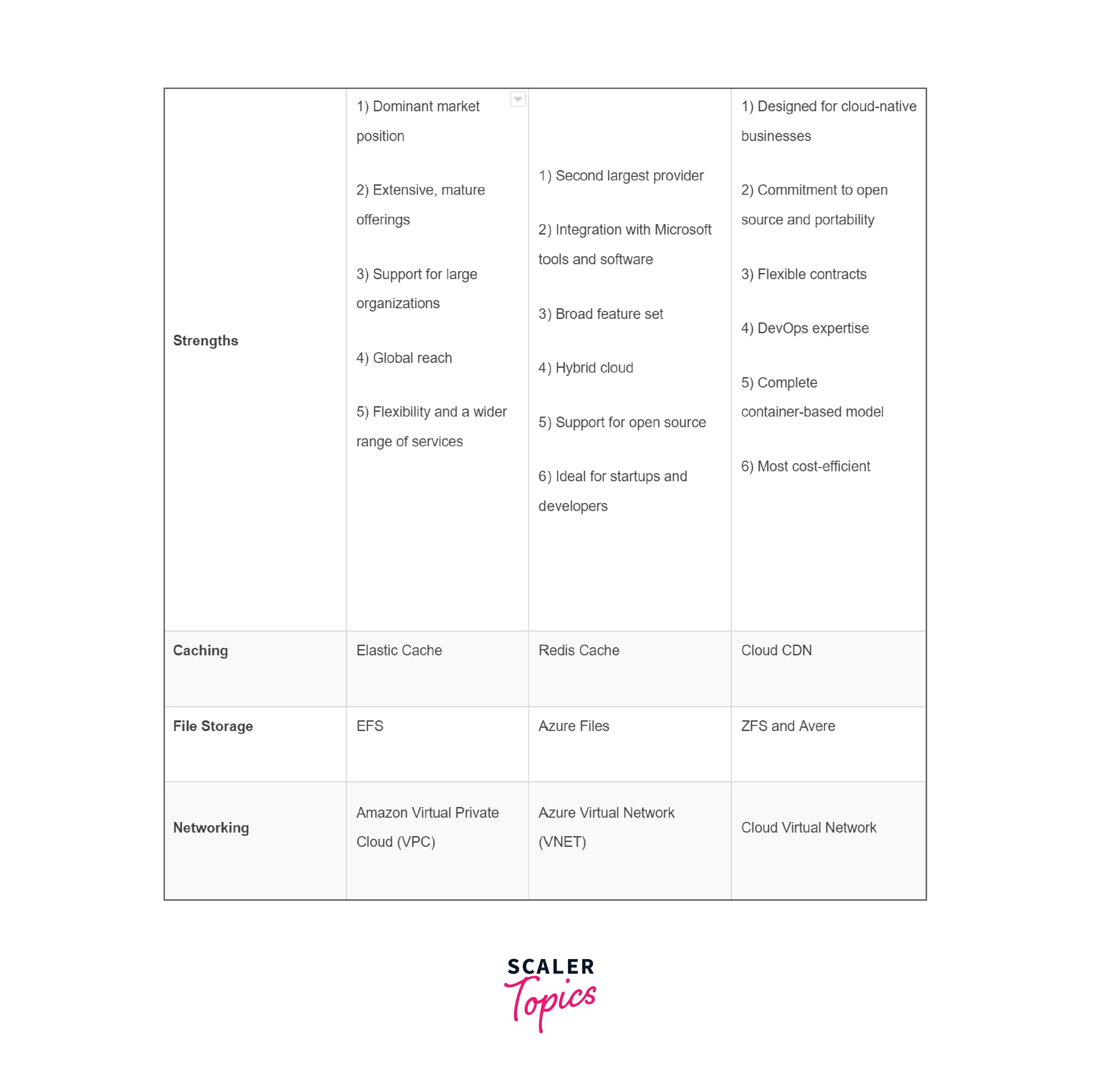
f) Key Cloud Tools
The three cloud service providers are now engaged in intense competition. Based on current trends and client demands, all three vendors provide the necessary tools and services and are expected to expand them in the future.
1. Key AWS Tools
- SageMaker: SageMaker is a different AWS service that is used to develop and deploy machine learning models. Along with allowing Alexa services, Greengrass IoT messaging, and Lambda serverless computing, it also features the Lex conversational interface.
- Machine learning and artificial intelligence: AWS has made Gluon available. Without prior AI experience, both developers and non-developers may create neural networks using this open-source deep-learning framework. An AI-powered camera called DeepLens is capable of developing and putting into practice machine learning algorithms for optical character recognition, image recognition, and object recognition.
Also apart of these tools for every competitor in the cloud, there are many competitive tools in the field of storage, compute, networking, analytics, databases, DevOps & machine learning.
2. Key Azure Tools
- Supporting Microsoft Software: To support Microsoft software that is already installed on a PC, Azure offers a number of choices. In Windows Server R2 and Windows Server, Azure Backup is linked to Windows Server Backup. Visual Studio projects are hosted on Azure by Visual Studio Team Services.
- Cognitive Services: Among the cognitive services provided are the Face API, Computer Vision API, Custom Vision Service, and Bing Web Search API. Microsoft delivers a serverless computing solution and other IoT management and analytics services and tools.
3. Key Google Cloud Tools
- IoT and NLP: Google Cloud offers APIs for cutting-edge technologies, including speech recognition, translation, and natural language processing. IoT and serverless services are also provided. These are still beta versions, though.
- Big On AI: Google Cloud is now leading the way in AI development. Credit should go to TensorFlow, an open-source software package for building machine learning applications. Many developers adore TensorFlow.
g) Hybrid and Multi-Cloud Options
- The best cloud solution for most businesses combines public and private clouds. A hybrid cloud enables you to integrate a private cloud, current infrastructure, and one or more public clouds. Since it is simply a mix of settings where you may run programs, it is a popular option among enterprises that have already invested a lot of money in IT infrastructure.
- Employing a variety of computing, storage, and service environments are advantageous for a business (on-premises infrastructure, private cloud services, and a public cloud). With the hybrid cloud, there is explicit cooperation between the multiple platforms.
-
AWS hybrid and multi-cloud
- Amazon ECS
- AWS Snowball
- AWS Snowcone
- AWS Outposts
- AWS Local Zones
- VMware Cloud on AWS
- AWS Wavelength
- Amazon EKS
- AWS Snowcone
-
Azure hybrid And multi-cloud
- Azure Arc
- Azure Backup
- Azure Active Directory
- Azure Security Center
- Azure Blob Storage
- Azure Stack
- Azure Centinel
-
Google cloud hybrid and multi-cloud
- Anthos
- Traffic Director
- Looker
- Cloud Build
- Operations
- Cloud Run for Anthos
h) Pricing
According to the IT industry, Microsoft Azure has the lowest on-demand pricing, with Amazon falling somewhere in the middle. All three systems offer reasonable price plans and additional cost-control options to all customers (reserved instances, budgets, and resource optimization). The price of the cloud platform is determined by several factors, such as Customer requirements, Usage, and user services.
| Machine Type | AWS | Azure | GCP |
|---|---|---|---|
| Smallest Instance | A main instance with two virtual CPUs and eight GB of RAM costs about US$69 per month from AWS. | Similar instances in Azure, such as those with 2 CPUs and 8 GB of RAM, run about US$70 per month. | GCP offers the most fundamental instance, which comes with two virtual CPUs and eight gigabytes of RAM, for 25% less than AWS. It will consequently cost you about US$52 every month. |
| Largest Instance | You will pay about US$3.97/hour for the most costly AWS instance, which has 3.84 TB of RAM and 128 CPUs. | The biggest Azure instance has 128 CPUs and 3.89 TB of RAM. About $6.79 an hour is spent on it. | With its biggest instance, 3.75 TB of RAM, and 160 CPUs, GCP takes the lead. You should expect to pay around US$5.32 per hour. |
AWS vs Azure vs Google Cloud - What is Optimal for You?
Today, AWS comfortably outperforms all other major cloud providers. Given that Azure and GCP are tenaciously climbing the list of top cloud providers, it's difficult to predict how long AWS will hold the title of the top provider. Although being the first of its sort gives AWS an edge, Azure and GCP each offer their advantages. Since Microsoft technologies are simple to integrate with Azure cloud, using Azure cloud makes more sense for many firms who utilize MS tools. Customers need to choose GCP because it has the finest price structure for the infrastructure supporting the Google Search engine and YouTube. Given everything, it would be wiser to say that selecting the best cloud provider for your needs is more important than selecting the greatest one overall.
Conclusion
- The three clouds— AWS, Azure, and Google —all work toward the same goal. They are providing essentially the same services.
- They each have unique advantages, drawbacks, and features. There is support for all platforms, operating systems, and architectural styles.
- Availability Zones, Market Shares, and Growth Rate, Which Organizations Use Them, Services, Key Cloud Tools, Hybrid and Multi-Cloud Options, and Pricing are the distinctions between Google Cloud, AWS, and Azure.
- This article in the end demonstrated which of the top three cloud services is the best suitable for use.
